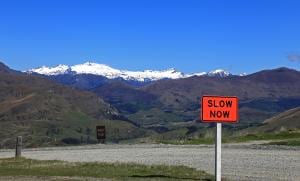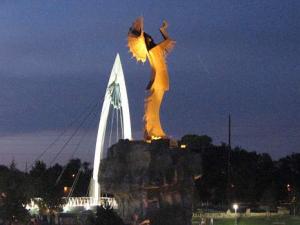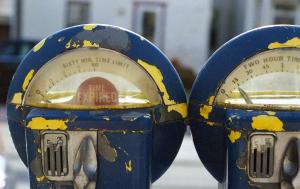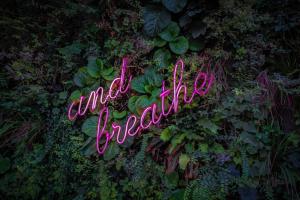Growing up in the south, I learned the finer art of slow. Of course I didn’t know I was in “the south.” Whenever someone says the “south,” my first objection is that it isn’t one monolithic “thing.” The south differs greatly in everything from food to God to football. Usually in that order.
Then there is of course the reverence that comes with the words “the south.” As if you could speak quotation marks aloud, these words are spoken like holy writ. Also like holy terror. The part of the US that gave birth to both beautiful cuisine and its own particularly sinister version (though not the first and certainly not the last) of slavery.
In a recent episode of Chef’s Table one southern food connoisseur called the history and culture of the south “Complicated.” Amen.
But in that complicated heritage, there is a “slow”.
 To refer to “slow” with a definite article like “a” or “the” – a slow – is to acknowledge a certain kind of difference. There are many different ways of slowing down, for instance. Sleep after a long trip, sure, but also a heart attack can bring things to a screeching halt.
To refer to “slow” with a definite article like “a” or “the” – a slow – is to acknowledge a certain kind of difference. There are many different ways of slowing down, for instance. Sleep after a long trip, sure, but also a heart attack can bring things to a screeching halt.
The realization that we are speaking too quickly, hurrying our words for whatever reason – the words that follow are a kind of slow.
But as I said there is a slowing of soul that came to me in a very natural way.
It was the “slow” of my grandmother’s garden. The “slow” of my grandfather, pacing the yard looking for twigs and weeds. A quiet deceleration that came through walks to the local baseball fields of my childhood, warming me to the idea that time was indeed slowing down.
I have only seen that “slow” a few times since. It happened once in a dive bar in the farm town where my wife and I lived for 5 years. With no one (well, there were exceptions) ordering shots of whiskey at 7 AM, and with the local restaurant closed, the farmers turned to the tavern for coffee and early morning community.
I went to the tavern one morning.
The air smells different in the rural spaces, you know? The single main street was still and open. Waiting for grain wagons and trucks of all denominations. Five beaten flatbeds were parked in front of the tavern, angled southwest to northeast, hood to tailgate.
I walked in under the cloud which I assumed was cigarette smoke, only to find that the light assumed a cloudy sheen through ages-dirty windows.
I sat down with two stools on either side. God only knows what compelled me to come down in the first place, and I say that with some confidence knowing that I was one of two pastors in that small town.
The man to my right turned to look at me. Slowly. The “slow”; there it was. He blinked twice. Even his eyelids were slow.
“Mornin’,” he said in a nicotine whisper.
“Hey,” I responded.
Though not too cheerily. This seemed to be the kind of place that required a somber pose.
The slow whisperer looked me up and down. Rightly so. I was the only one in khaki cargo pants, a green fleece pullover, and the only one carrying a significant amount of hair product.
I didn’t belong. In fact, my mannerisms and posture was – how do I say this? – too quick for that place. I was the only one in the room who appeared to be in a big damn hurry, and for no apparent reason. For the farming men around me, winter had come. No one was going anywhere.
I was going somewhere, it seemed. Everywhere all at once, even while sitting on that stool.
I drilled through another ¼ cup of the coffee, which was coffee in the sense that it was born when water went through beans. What kind of beans and how much water is debatable.
The “slow” of my memories started to creep back in, as if everyone at the bar knew my grandmother and her garden. My grandfather and his yard. It felt like home, like a sudden jolt of familiarity in a strange and foreign land.
Just then, the person to my left piped up. The tractor cap, jeans and worn Carhart jacket turned simultaneously towards me as if I had just fallen off my stool. Yet it was a slow suddenness. Even the realization that I – some sort of prep school poltergeist – had infiltrated the ranks of the men of the land didn’t break the slow.
“Son, are you lost?” he said.
It was a fair statement. Matter of fact and loud enough for at least 3 other patrons to hear, which given the looks on their faces was a question the group shared.
Though I answered him, saying I was the new pastor at the church down the street, I realized then that he was right.
I was lost. Lost in my own speed.
I wasn’t a workaholic, far from it. I’ve never seen the value of burning out for the sake of the Gospel when, in fact, the core goodness of the Gospel is that burnout isn’t necessary. In fact it is the antithesis of what the Gospel frees humanity to become.
Instead, I had lost the slowness in my spirit. I had let the restlessness of wanting take hold: wanting for my congregation, wanting for my family, and wanting for my profession. What did I want? Who knows.
For restless folks, wanting need not have an object. The object is the wanting.
I left the tavern and now, sitting at my daughter’s swim practice with 20 years of gray in my hair, I think about that moment.
As I think about the tavern, “the south,” and the “slow” I realize that much of the beauty of Jesus is this “slow.”
There is a slowness of spirit that remains even when we move quickly. The slow makes the difference between quickness and hurry.
Jesus had a softness to his thinking as well. The “slow” allows rain to fall on the righteous and the unrighteous. When the posture of our inner selves is pointed towards a wanting in season, we’re able to hold paradox close.
Without some measure of the “slow,” love just isn’t possible. With no ability to cease deep within us, we will never know others well enough to love well.
The “slow” is not a geographical oddity. Nor is it a hallmark of age and personality. There are correlations, but ultimately the “slow” is the measure of how willing we are to take a particular posture. The posture that says:
We’re all lost, son. We’re waiting to figure out where we are. Waiting for someone to show us what’s next. We are all longing for a “slow.”
(Photo by Nareeta Martin on Unsplash)











